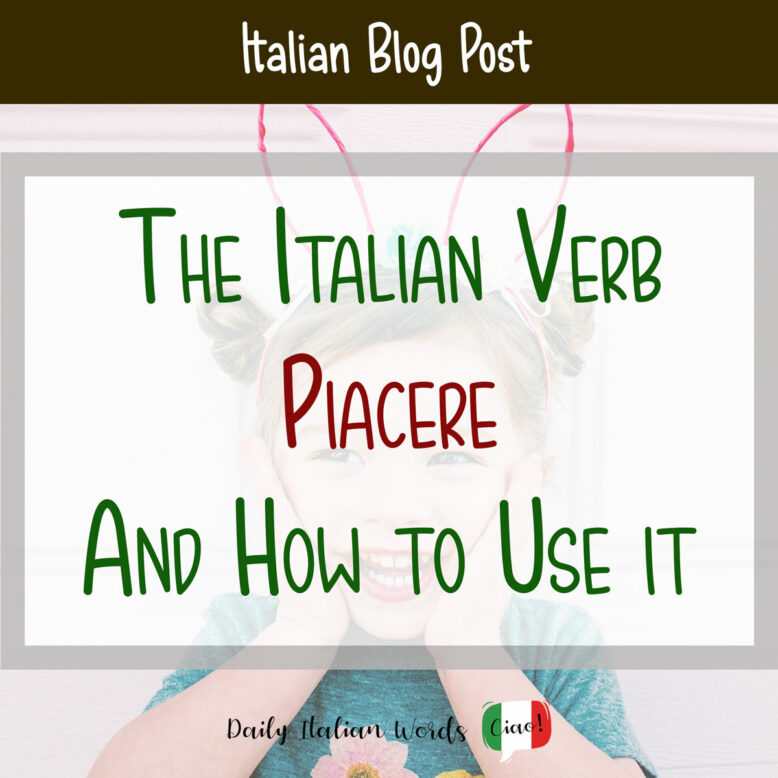Today we are going to tackle one of the trickiest Italian verbs for English speakers: the verb piacere / to like.
But why is it so difficult? What is the problem?
I have to admit that there are quite a few critical points, and in this article I will try to explain them in an easy and complete way.
These are the aspects we are going to consider:
- The verb piacere is irregular: let’s start with the present tense
- The direction of the verb piacere is “opposite” to that of the English verb to like
- Focus on: piace & piacciono
- The verb piacere is indirect (intransitive)
- Piacere followed by another verb
- The negative form of piacere
- The verb piacere conjugated in its most useful tenses

1. The verb piacere is irregular: let’s start with the present tense
A verb is irregular when its conjugation requires changes in its initial part, the root, in addition to the replacement of -ARE, -ERE, -IRE with new endings.
Due to what happens around the letter -c, the verb piacere is irregular, but luckily it still remains easily recognisable in all its forms.
This is the present tense of the verb piacere, called presente indicativo in Italian. We will speak about its translation in the next paragraph.
Io piaccio – “I’m liked”
Tu piaci – “You are liked“
Lei/Lui piace – “She/He is liked”
Noi piacciamo – “We are liked”
Voi piacete – “You (all) are liked”
Loro piacciono – “They are liked”
2. The direction of the verb piacere is “opposite” to that of the English to like
When in English you say I like ice cream, you are actively doing the action of “liking”. But in the equivalent sentence in Italian mi piace il gelato you are “receiving” the good and tasty qualities of the ice cream.
Il gelato (ice cream) is actually the subject of the sentence even if it might seem counterintuitive. For this reason, it could be helpful to think of piacere as “to be pleasing to” or even “to be liked by” instead of to like, in order to see clearly how to handle its structure.
Mi piace il gelato
Translation → I like ice cream
A translation closer to the Italian version → “ice cream is pleasing to me”
A translation with the original word order → “to me is pleasing the ice cream”
This reversed structure can appear odd but it’s very important to become familiar with it. Otherwise, you run the risk of saying: io piaccio due to having in mind the English I like. It’s a common mistake, but you might end up sounding a little vain as it will be understood as: I am liked by / I please people or People like me!
3. Focus on: piace & piacciono
We have just seen what to say when you like one ice cream: mi piace il gelato.
But what happens when you like more than one thing? In this case, the verb must be conjugated in the 3rd person plural: piacciono. In this way, you would switch from “it is liked by me” to “they are liked by me.”
Mi piacciono i cappelli colorati
I like colourful hats
“Colourful hats are liked by me” / “Colourful hats please me”
Mi piacciono molto i gatti
I really like cats
“Cats are liked by me” / “Cats please me”
The two forms of the verb that are most frequently used are piace and piacciono (the 3rd person singular and plural respectively), but of course, the verb changes according to the subject, just as in any other verb conjugation. This can appear strange in Italian because of the order of the words, but there is really nothing new.
A couple of examples:
Tu mi piaci or just mi piaci
I like you
“You are liked by me” / “You please me”
O (noi) vi piacciamo così come siamo, o andiamo via
Either you like us as we are, or we will leave
“Either we are liked by you as we are, or we leave” / “Either we please you as we are, or we will leave”

4. The verb piacere is indirect (intransitive)
Piacere is an indirect verb, or technically, an intransitive verb. This means that it always needs a preposition in order to be connected with the object it refers to. In this case, the Italian preposition is a which in English often corresponds to the preposition “to” as in “is pleasing to”.
If you are already wondering why you didn’t see the preposition a in the examples above, that’s just because sometimes it becomes invisible. In fact, the preposition a can merge with the pronouns me, te, lei/lui, noi, voi, loro if these pronouns are placed before the verb, but it always remains separate if the pronouns come after it.
The following versions of the same Italian sentence are grammatically correct:
- Mi piace il gelato → the preposition and the pronoun are contained in the word mi, placed before the verb
- A me piace il gelato → the preposition and the pronoun remain separate, before the verb
- Il gelato piace a me → the preposition and the pronoun remain separate, after the verb
As mentioned before, the preposition a merges with pronouns only if placed before the verb. This happens with all intransitive verbs*, but in this list, we will consider only the verb piacere:
Mi piace/piacciono → piace/piacciono a me (“to me”)
Ti piace/piacciono → piace/piacciono a te (“to you”)
Le piace/piacciono → piace/piacciono a lei (“to her”)
Gli piace/piacciono → piace/piacciono a lui (“to him”)
Ci piace/piacciono → piace/piacciono a noi (“to us”)
Vi piace/piacciono → piace/piacciono a voi (“to you”)
Gli piace/piacciono → piace/piacciono (a) loro** (“to them”)
When you don’t use a personal pronoun but you state the name or you mention the actual person, the preposition “a” will always be present:
A Giulio piacciono i cappelli colorati
I cappelli colorati piacciono a Giulio
Giulio likes colourful hats
A mia mamma non piace la musica che ascolto
La musica che ascolto non piace a mia mamma
My mom doesn’t like the music I listen to
But is it really the same to say mi piace il gelato or a me il gelato piace or il gelato piace a me?
Although they are grammatically equivalent, the answer is no, they aren’t really the same.
The way a language is actually used by its speakers is the most important feature to take into consideration. The most spontaneous and common way to express a preference or a judgment with the Italian verb piacere is: mi piace il gelato, with the indirect pronoun before the verb.
When you choose the two-word version, “a me”, you add a certain emphasis to the fact that it’s you who likes the ice cream while (maybe) someone else doesn’t.
A me piace il gelato, invece Carla preferisce mangiare cibi salati
I like ice cream, but Carla prefers to eat salty foods
*Among the most important Italian intransitive verbs that have the same characteristics of piacere are: interessare / to be interested in; bastare / to be enough; mancare / to miss, to lack; servire / to need.
** In the most conservative use of the language, loro should be placed only after the verb with no preposition. In the everyday use of the language, however, loro is commonly used as all other pronouns.
5. Piacere followed by another verb
You might “like / enjoy / love doing something” and you can certainly use the verb piacere to express it in Italian. Just remember that when piacere is followed by another verb, the latter is always in its infinitive form. Piacere in this situation is always conjugated in its 3rd person singular.
I like reading → Mi piace leggere
Giorgio likes to cook → A Giorgio piace cucinare
We like to spend our holidays at the sea → Ci piace fare la vacanze al mare
6. The negative form of piacere
In order to say that you don’t like something, you need to put non before the pronoun, if the pronoun is mi, ti, gli, le, ci, vi, gli.
Non mi piace la tua cravatta
I don’t like your tie
Non le piacciono i broccoli
She doesn’t like broccoli
But non goes immediately before the verb piacere if the pronoun (or the name of the person) is preceded by the preposition a: a me, a te, a lui/lei, a noi, a voi, a loro.
A me non piace la tua cravatta
I don’t like your tie
A lei non piacciono i broccoli
She doesn’t like broccoli
Non piacciono i broccoli a Francesca?
Doesn’t Francesca like broccoli?
As for the English to like, there is also a form of piacere preceded by dis-, a verbal prefix with negative value: dispiacere.
Its meaning, however, is neither to dislike nor not to like, but rather “to be sorry”.
Mi dispiace che non possiate venire alla festa
I’m sorry you can’t come to the party
7. The verb piacere conjugated in its most useful tenses
Piacere can be conjugated in all Italian tenses (which are many) for any subject and indirect pronouns, but listing all the combinations would be quite confusing. So I thought I would indicate here what I consider to be the most useful tenses to familiarise yourself with. In the following examples, the verb piacere will be in the 3rd person, both singular and plural, referring to various pronouns, in common and “ready to use” sentences.
Indicativo Presente
Ti piace andare a scuola?
Do you like going to school?
Mi piacciono i romanzi
I like novels
Indicativo Passato Prossimo
Singular/plural masculine subject:
Mi è piaciuto il tuo discorso
I liked your speech
Gli sono piaciuti i tuoi regali
He liked your gifts
Singular/plural feminine subject:
Mi è piaciuta molto la tua intervista
I really enjoyed your interview
Ci sono piaciute molto le foto di Stefano
We really liked Stefano’s photos
Indicativo Imperfetto
A mia figlia piaceva giocare con Elena
My daughter loved playing with Elena
Una volta mi piacevano i dolci, ora preferisco il salato
I used to like sweets, now I prefer savoury foods
Condizionale presente
Mi piacerebbe andare in vacanza al mare
I would like to go on holiday to the seaside
Non vi piacerebbero dei giorni in montagna?
Wouldn’t you like some days in the mountains?
Condizionale passato
Singular/plural masculine subject:
Mi sarebbe piaciuto incontrarti prima
I would have liked to meet you sooner
Quei vestiti non mi sarebbero piaciuti se fossero stati più colorati
I wouldn’t have liked those clothes if they had been more colorful
Singular/plural feminine subject:
La minestra non mi sarebbe piaciuta senza sale
I wouldn’t have liked the soup without salt
Ci sarebbero piaciute finestre più grandi
We would have liked bigger windows

Niccolò Curini has been teaching Italian since February 2016, primarily at the Language Center of the University of Goettingen in Germany. In this role, he led courses ranging from level A1 to B2. To qualify for this position, he obtained the DITALS certification, enabling him to teach Italian as a Foreign Language to university students. Social media: Instagram – Facebook – Twitter


